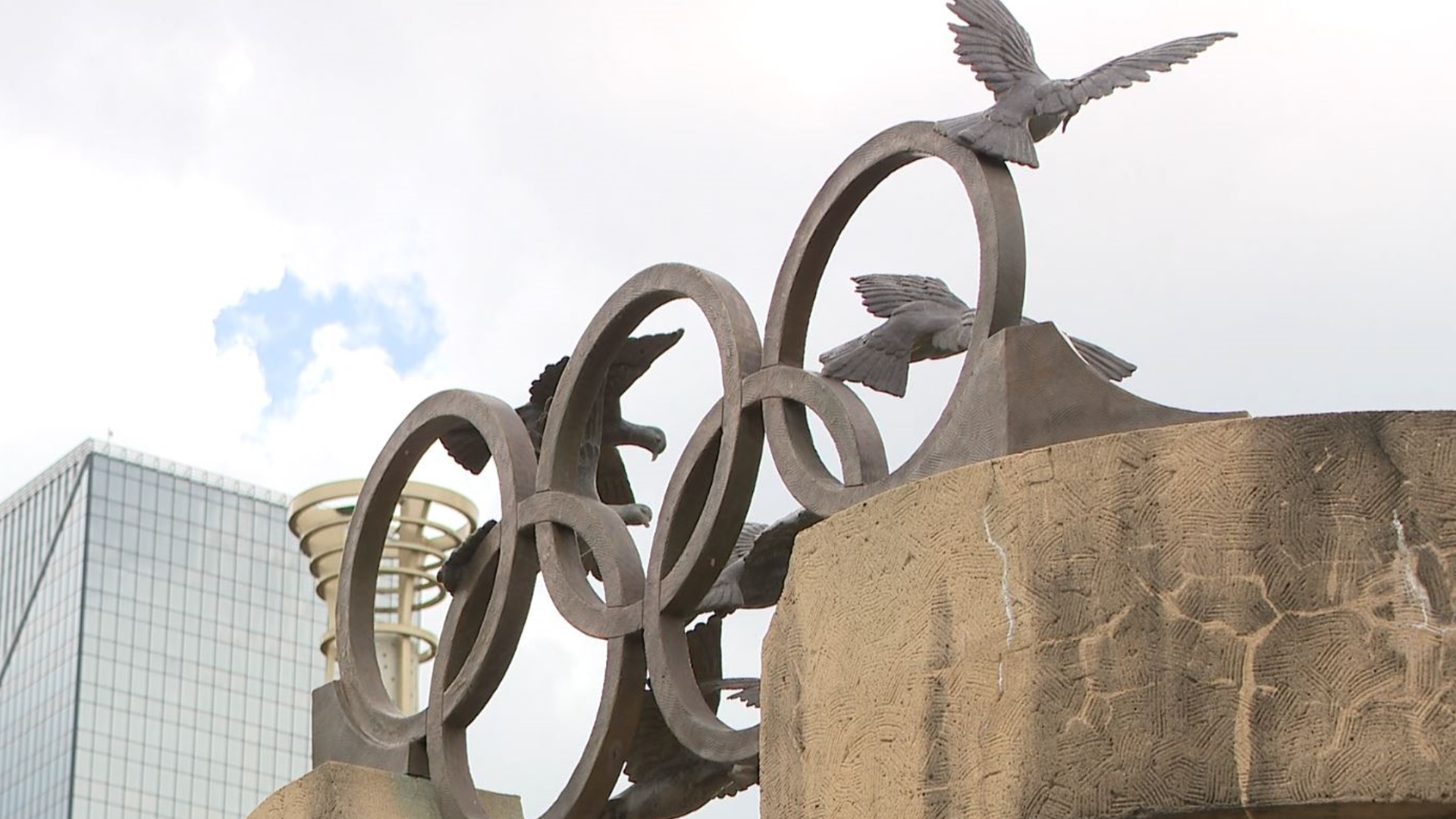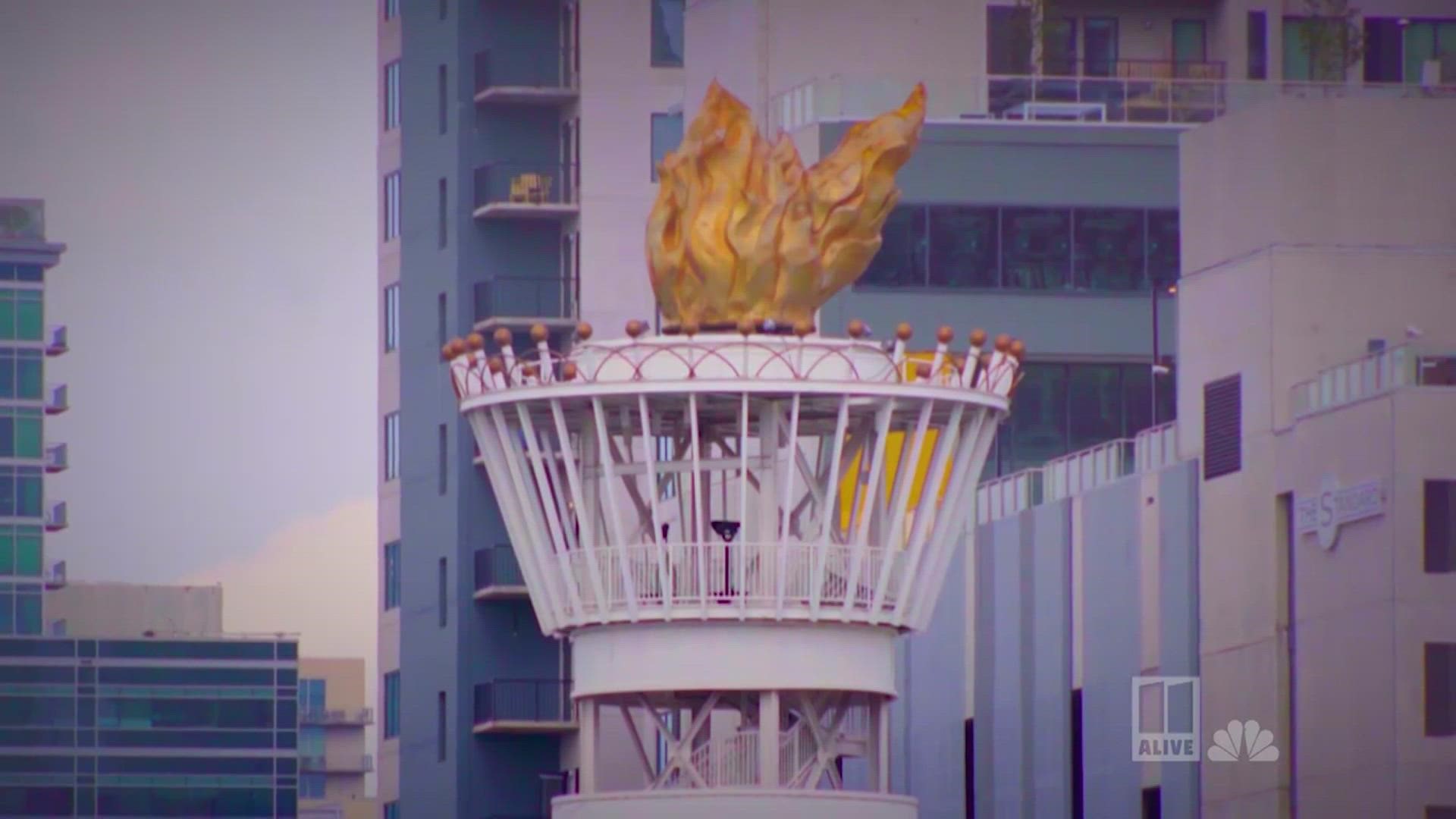'Immigration became an economic issue' | How Latinos helped Atlanta get Olympic ready
The international competition helped Atlanta become an international city.

From the iconic Fountain of Rings to Turner Field, the legacy of the 1996 Olympics in Atlanta is evident in the city's skyline. Still, the impact of the international games can also be seen in Georgia's growing Latino community.
Before Georgia State University got its stadium, Atlanta had Buford Highway. Before an established Centennial Olympic Park, the Latin American Association and Plaza Fiesta were taking shape - some of the first pieces of evidence were when Latinos started to build a community in Atlanta before they built the infrastructure for the Olympics.
"I had seen some data that said there were 100,000 Latinos in Georgia, and we were astonished. I mean, we thought, 'oh my goodness, how could there be that many Latinos here in Atlanta?' former state senator Samuel Zamarripa said, recalling the early 1990s.
"Well, that number became exponential as the decade went on."
Olympic opportunity
Before becoming Georgia's first Hispanic state senator, Zamarripa worked under Andrew Young as the former mayor bid to bring the games to Georgia.
Atlanta won - championing a new era of growth.
Zamarripa explained how the South was going through an economic explosion in the 90s. Data shows that Latinos were already in Georgia in the 70s and 80s and made up a strong agricultural workforce. Zamarripa, who also owns a vineyard, explained much of the community settled in the southern part of the state to help harvest crops like peaches and pecans.
"The Olympics just exaggerated the need for labor because things had to be done fast," he said. "In the early 90s, there was no real immigration debate."
With new economic prowess, Atlanta rushed to get Olympic-ready.
Crews broke ground on never-fathomed-before infrastructure, constructed arenas, and new sports facilities, which changed much of Atlanta's framework to essentially build a host city that was grand enough to hold the 100th modern Olympic Games.
Atlanta needed help, so leaders looked for a source, which would also become the source of what researchers refer to as the Southeast's "Latino boom."
"I think that there were a lot of candid discussions at the Atlanta Olympic Committee," Zamarripa said, calling the infrastructure work an enormous undertaking.
Despite funding and years of preparation, Atlanta's Olympic plans for infrastructure were three months behind schedule.
"So immigration became an economic issue," Zamarripa said. "There was opportunity, there was good wages, there was a shortage of that labor. And so, I think a lot of people were willing to look the other way because so much was at stake."
Latinos, primarily Mexicans, came in droves to help build the infrastructure the city was lacking, but it was more than just work that attracted this new group.
Zamarripa cited the South's warm weather, Buford Highway's restaurants and shops, and daily bus service between Atlanta and Houston.
"Two and three busses would arrive every day from that area," he explained, nodding to the proximity to the United States' southern border.
He said Atlanta was even more familiar due to the Braves' game-changing decision to broadcast games internationally.
"The most well-known baseball team in Mexico was the Atlanta Braves," Zamarripa said. "So the Mexican community knew about Los Bravos."
Constructing a community
Immigrants came to help build Olympic landmarks - and stayed to build new lives, and in turn, helped Atlanta's Cultural Corridor blossom.
"The Latino workforce not only discovered Atlanta and the region, but they found a lot of their cousins and their brothers and sisters here. And they all came - they opened stores, they opened laundromats, they opened tiendas, they opened bodegas," Zamarripa said.
Soon, the community created its own Atlanta landmark.
"And the next thing you knew, Buford Highway was a sort of the Ellis Island for the Latino community in Atlanta," he said.
As Latinos constructed their community, a new conversation began to unfold.
Census trends show Latinos already discovered Georgia in the 80s, and the population quickly grew. The population made progress as Olympic opportunities drew them.
"Let's just say the Olympics was the first domino," Daniel Vargas, the owner of Vargas and Amigos advertising agency and an established leader in Georgia's Latino community.
Lacking Olympic glory
Vargas, a proud Puerto Rican, moved to Georgia in the 70s on a work transfer and explained how the state was not yet on the map at the time.
"I mean, when I first started working here, we had to tell people where Georgia was because it wasn't recognized by the international community," he said.
In turn, people didn't understand his ethnicity either.
He said he'd explain that he was a minority, but during the 70s, people would equate the term to African American. In his experience, he said he wasn't dark enough to be Black but was not light enough to be white - so he was always left explaining himself.
"When I got here people said 'oh, it's great you're Puerto Rican, what's a Puerto Rican?" he recalled. "So they said, well, you know, we better take care of you because you're the only one we got."
He embodied that - and got to work.
Vargas climbed the corporate ladder, working for well-known brands like Coca-Cola, guiding his career in Hispanic advertising and marketing in Georgia just as the state was working to attract the Olympics. He also noticed how the community gained prominence. He said he joined boards and committees and ensured everyone knew he was Hispanic.
His agency handled accounts with Coca-Cola, Pizza Hut and the Olympics, working to attract a new audience.
Over time, he adopted a new occupation.
"People would say, 'what do you do for a living?' and I'd say 'I'm a Hispanic leader'" he explained with a chuckle. "Leading who? I don't know."
Slowly, he gained a following, and he said he noticed his work grew along with Atlanta's efforts to be an Olympic city.
"We had to sit there and improve ourselves," he said of the Latino community. "Because you've got to set an example."
But that wasn't easy; as Vargas explained, Atlanta's Olympic history wasn't all glory.
He said with the influx of immigrants, cultures clashed, work was plenty but resources were few, and Atlanta's new residents weren't always given the benefit of the doubt and were sometimes taken advantage of.
"I have an agency called Vargas, Flores and Amigos, right? They look it up and think I'm a lawyer," he explained.
Latinos shared stories of going weeks without pay, despite working nonstop in construction. People struggled with housing and transportation and felt they were being mistreated. Vargas said he was even helping people bail out of jail.
"Nobody talks about the bad," he said. "The Latino community, on the whole, is trying to be accepted."
Gateway of dreams
So after the medals were handed out and the athletes went home, Vargas and others helped the workers build a new vision of what their life - and Atlanta - could be.
"When I first got here, I used to tell people, I had to look in the rearview mirror to see Hispanic groups. And, you know, all that changed because of the Olympics," he said. "What happened is they came to work, but they also sent for their wives and children and pretty soon they developed a community here."
A community that looked and sounded different than when Vargas first arrived in the Peach State.
"It allowed us to hear our music, it allowed us to hear our story from our side, it allowed us to get food that we weren't accustomed to," he said. "So it was a really welcoming opportunity."
Hispanics and Latinos are among the fastest-growing groups in the nation; U.S. Pew Research shows that's the case for Georgia too.
More than one million Latinos now live in the Peach State, according to the 2020 Census.
“Optimistically, the future is going to be bright. We are going to colleges, we are getting educated, we are the next generation," he said. "The world is never going to be the same again."
Vargas said that's the true Olympic win.


